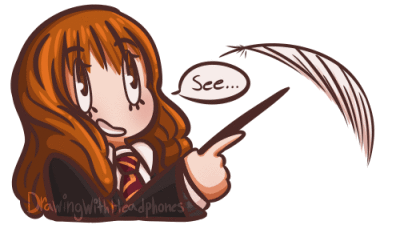Writing a College Paper on Hermione Granger
For some of us, it’s finals week or – at the very least – the end of the school year. I’ve been reflecting back on my most successful assignments of the year. Believe it or not, one of these assignments was about Harry Potter. I chose to analyze Hermione’s use of logic in the Potter series. Whether you need final paper topic inspiration or just want something fun to read, this article is all about Hermione.
I titled my paper “Analyzing the Use and Importance of Logic in Literature.” The paper was for my symbolic logic class, and we could choose any topic we wanted. As long as our papers contained information related to class content, we could choose anything. My main argument was that Hermione uncovers fallacies in other characters’ arguments. A quick clarification: Logical fallacies are basically inaccuracies in specific arguments that make said argument invalid. While writing about the logical vocabulary wasn’t interesting, it was worth it because I got to write about one of my favorite fictional characters.
Since I’m pursuing a gender studies minor, I also included some information about Hermione’s cultural influence. This doesn’t directly pertain to logic, but Hermione is one of the few logical characters I’ve encountered who is female. Not only does she represent an oppressed class of people but Hermione is the most well-written logical character I’ve ever encountered. I argued why Hermione is just as intelligent when it comes to using logic as the famous Sherlock Holmes. Hermione proves that women can be equally as logical as men, and this is an important lesson for young girls to read about. I summarized the first section of my paper by explaining that logic is used in literature to define fictional characters’ personality traits as well as to further narratives with intelligent plot points.
I had to include specific scenes to support my reasoning. The scene I chose was when Hermione solves the potions riddle in Harry Potter and the Sorcerer’s Stone. I included some quotes from the same chapter because Hermione references why logic is important to wizardry. This potions riddle involves the process of elimination, deductive reasoning, and probability. All of these are techniques employed in logic problems. The multi-step process takes Hermione only a few minutes to solve. Each line of the riddle has a hint to identify the potions. It’s set up like a traditional logical equation. Logic problems are usually set up as “if not A, then B,” and Hermione uses this rationale to distinguish characteristics between the potions.
Another way Hermione uses logic is to combat prejudice and discrimination in the wizarding world. Hermione excels at spotting fallacies in people’s arguments. Hermione always insists that there is no logical reason to discredit Mudbloods because that’s insulting an entire group of people. When someone insults Hermione for being a Mudblood, she argues against appeals to tradition. An appeal to tradition is when someone argues that tradition should be taken as a fact and as grounds for a conclusion. Hermione tries to convince other wizards that just because it was once considered socially acceptable to ban Mudbloods from wizarding school, that doesn’t need to always be the case.
Another kind of logical argument Hermione dismantles is the appeal to fear. Appeals to fear are defined as when an arguer ignites a fear of something and then uses that fear as a premise for a conclusion. In the Harry Potter books, wizards are scared of the name Voldemort so much that no one says it. However, all this does is create a culture of fear where everyone is anxious from not speaking Voldemort’s name. Hermione is one of the few characters who argues that this reasoning isn’t valid. She is against appeals to fear because, in her eyes, all this does is corrupt people’s opinions. In Hermione’s eyes, fear isn’t productive or helpful.
I’m proud of the A I received on this paper. Plus, it’s less stressful to research something you feel passionately about. With Hermione as my motivation, it was easy to see the paper through. Don’t be afraid to ask your professors if you can choose a unique paper topic. Almost every time I’ve asked, my professors have given me free rein. Stick to the syllabus, but don’t be afraid to express your own creativity.








